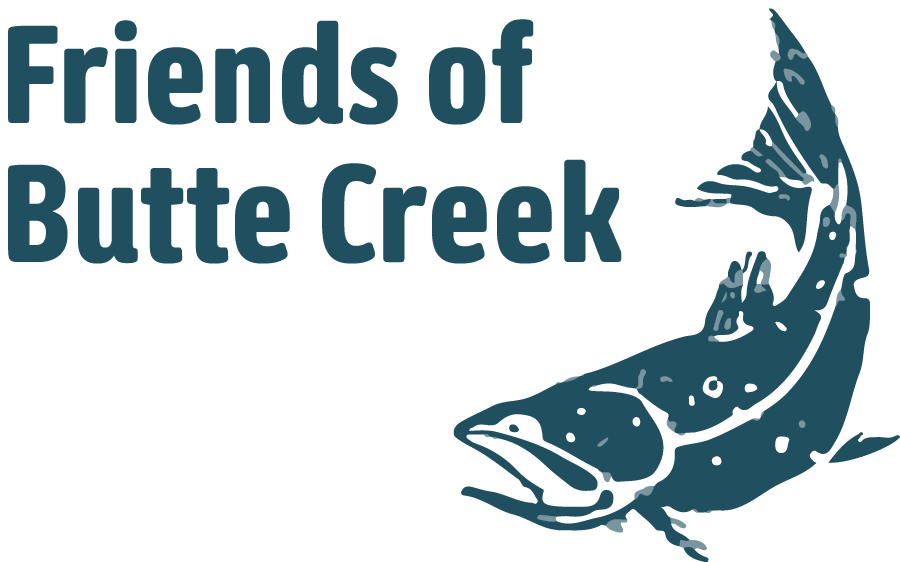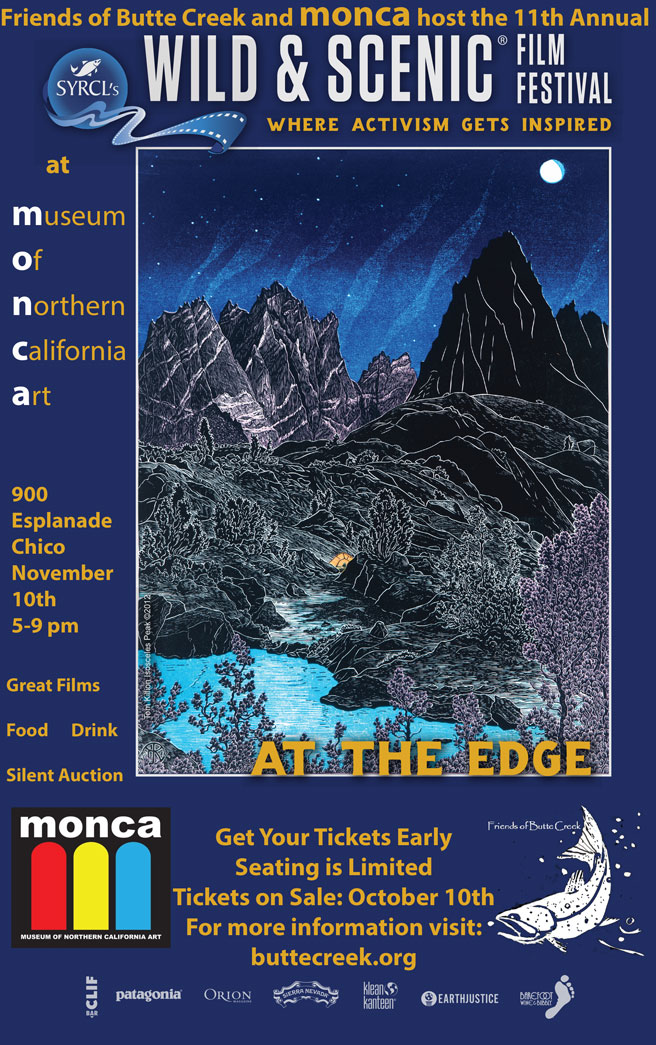monca (Museum of Northern California Art)
900 Esplanade, Chico
Friends of Butte Creek and monca are excited to co-host this years Wild and Scenic Film Festival. Your support will directly benefit the salmon preservation efforts of FBC and increasing our accessibility to art in the North State. Our annual celebration of film, art and the environment won’t disappoint.
At the Edge
That’s the theme of the 11th Annual Wild and Scenic Film Festival On Tour coming up at the monca, Museum of Northern California Art.
This years event will feature appetizers with your ticket and a no-host bar. As usual we will have a wonderful selection of silent auctions items and free drawings will be offered.
The Wild and Scenic Film Festival On Tour is a benefit for the Friends of Butte Creek. Films this year are focused on the theme of “At the Edge”. 2017 has presented a whole new and unexpected threat to our environment. We need to strengthen our resolve to leave a better planet for the future generations. Join us in supporting these efforts.
With monca as the host for the event we agreed to make this a benefit for them as well. This year’s intimate setting in the galleries will help them realize the dream of restoraing the auditorium for the enjoyment of the entire North State. We are very grateful and excited to share this benefit. To join our sponsors for this years event click on the link below. FBC and monca thank you for your support!
Friends of Butte Creek works to raise awareness and to provide protection for the future of the Last Best Run of Spring Run Salmon in California.
Doors open at 5 pm, Films at 6 pm. Appetizers included, no-host bar. Seating is limited.




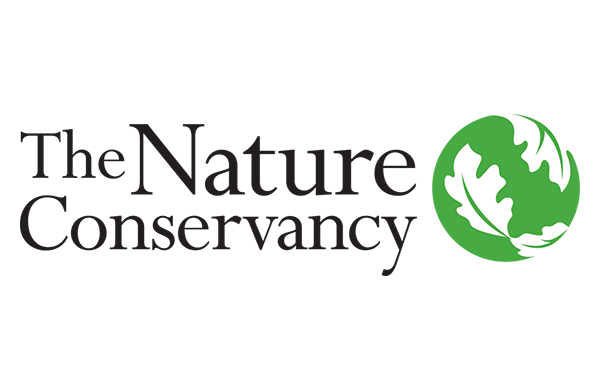

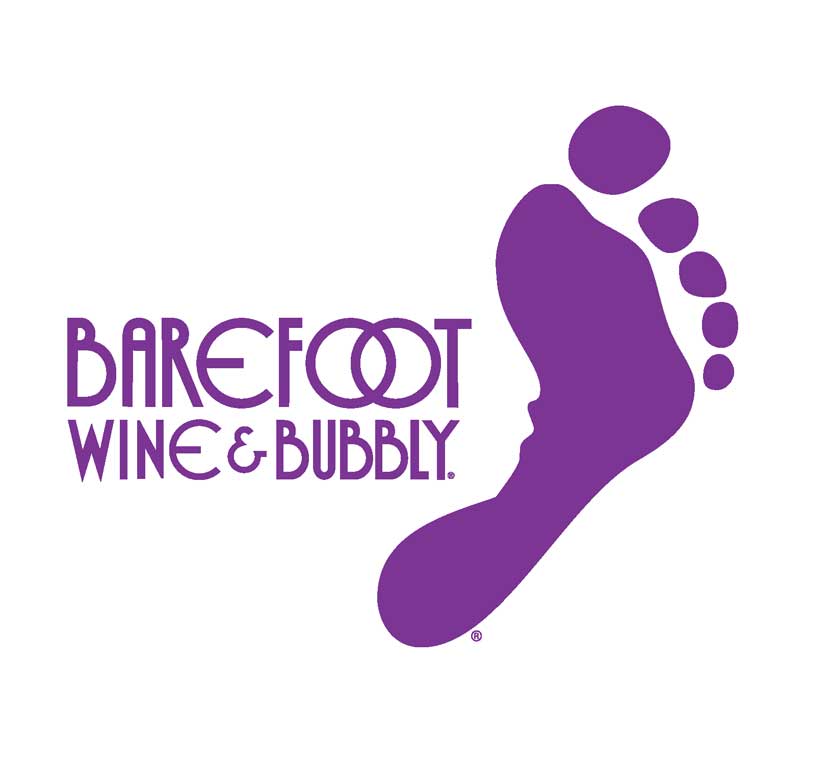
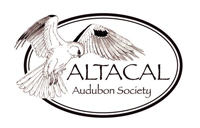
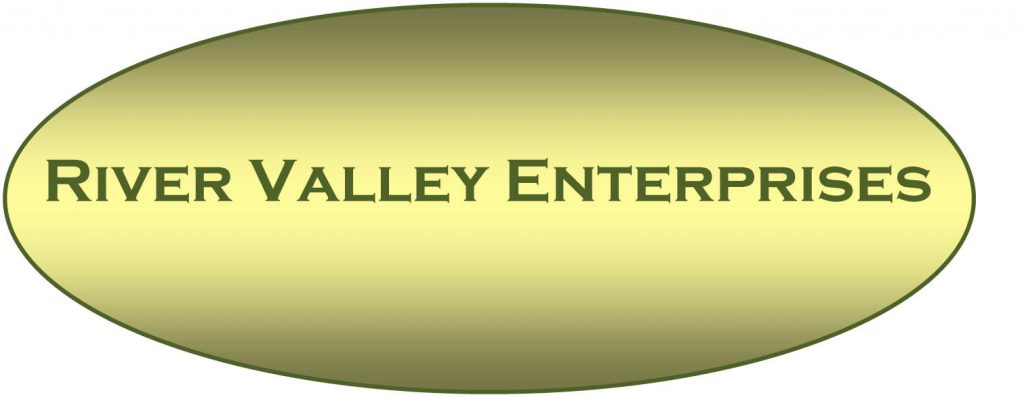
Volunteers, Silent Auction Donor and the many Friends of Butte Creek
Greg Will and Marji Thomas
Anonymous Fisheries Biologist and Friend of Butte Creek
Fair Trade the First Step
 13 mins. (Alex Lowther, Michael Malagon, Campbell Brewer, Little Village Films) How is your clothing made? Patagonia’s new short film investigates why choosing Fair Trade Certified clothing is an important first step toward changing the garment industry.
13 mins. (Alex Lowther, Michael Malagon, Campbell Brewer, Little Village Films) How is your clothing made? Patagonia’s new short film investigates why choosing Fair Trade Certified clothing is an important first step toward changing the garment industry.
Pangolin
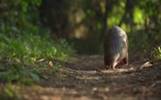 13 mins. (Katie Schuler, Nick Rogacki) This is an intimate glimpse into the journey of a single pangolin; from the moment it is taken from the wild to its final destination in China. Filmed on location across three countries with the help of reformed poachers and wildlife enforcement officers, the film acts as a surrogate for an estimated hundred thousand pangolins that are poached and smuggled annually throughout Southeast Asia and Africa. This film seeks to inform a broad audience about pangolins and the illegal trade they are central to, in order to address the very real danger that pangolins might be extinct before much of the world ever knew they existed. Filmed with minimal commentary to be as immersive as possible, Pangolin offers audiences the opportunity experience the life, death and afterlife of the most illegally trafficked mammal on the planet.
13 mins. (Katie Schuler, Nick Rogacki) This is an intimate glimpse into the journey of a single pangolin; from the moment it is taken from the wild to its final destination in China. Filmed on location across three countries with the help of reformed poachers and wildlife enforcement officers, the film acts as a surrogate for an estimated hundred thousand pangolins that are poached and smuggled annually throughout Southeast Asia and Africa. This film seeks to inform a broad audience about pangolins and the illegal trade they are central to, in order to address the very real danger that pangolins might be extinct before much of the world ever knew they existed. Filmed with minimal commentary to be as immersive as possible, Pangolin offers audiences the opportunity experience the life, death and afterlife of the most illegally trafficked mammal on the planet.
Ace and the Desert Dawg
 9 mins. (Brendan Leonard, Forest Woodward, Stefan Hunt, Joe Peters, Max Lowe) For his 60th birthday, adventure photographer Ace Kvale and his dog, Genghis Khan, set out for a 60-day backpacking trip in Utah’s canyon country. The pair tells the story of their trek, friendship, and Genghis records it on his Desert Dawg Adventure Blawg.
9 mins. (Brendan Leonard, Forest Woodward, Stefan Hunt, Joe Peters, Max Lowe) For his 60th birthday, adventure photographer Ace Kvale and his dog, Genghis Khan, set out for a 60-day backpacking trip in Utah’s canyon country. The pair tells the story of their trek, friendship, and Genghis records it on his Desert Dawg Adventure Blawg.
Red Wolf Revival
 24 mins. (Roshan Patel, Nestbox Collective) This is the story of the last remaining wild population of red wolves. Centered on the historic recovery effort in Eastern North Carolina, the film documents the multifaceted struggle to reintroduce one of the rarest animals on earth in the face of cultural, economic, and biological challenges in North Carolina.
24 mins. (Roshan Patel, Nestbox Collective) This is the story of the last remaining wild population of red wolves. Centered on the historic recovery effort in Eastern North Carolina, the film documents the multifaceted struggle to reintroduce one of the rarest animals on earth in the face of cultural, economic, and biological challenges in North Carolina.
Gorongoza
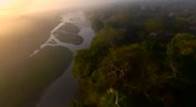 7 mins. (Neil Losin, Nate Dappen, Day’s Edge Productions) This is the story of Greg Carr and his involvement in the restoration of Gorongosa National Park after its destruction from 30 years of war in Mozambique. The film also features Princeton biologist Rob Pringle, who does research in the park.
7 mins. (Neil Losin, Nate Dappen, Day’s Edge Productions) This is the story of Greg Carr and his involvement in the restoration of Gorongosa National Park after its destruction from 30 years of war in Mozambique. The film also features Princeton biologist Rob Pringle, who does research in the park.
Forget Shorter Showers
 11 mins. (Jordan Brown, Derrick Jensen) Would any sane person think dumpster diving would have stopped Hitler, or that composting would have ended slavery or brought about the eight-hour workday; or that chopping wood and carrying water would have gotten people out of Tsarist prisons; or that dancing around a fire would have helped put in place the Voting Rights Act of 1957 or the Civil Rights Act of 1964? Then why now, with all the world at stake, do so many people retreat into these entirely personal solutions.
11 mins. (Jordan Brown, Derrick Jensen) Would any sane person think dumpster diving would have stopped Hitler, or that composting would have ended slavery or brought about the eight-hour workday; or that chopping wood and carrying water would have gotten people out of Tsarist prisons; or that dancing around a fire would have helped put in place the Voting Rights Act of 1957 or the Civil Rights Act of 1964? Then why now, with all the world at stake, do so many people retreat into these entirely personal solutions.
Plastico
 9 mins. (James Q Martin) Beach communities around the world suffer from an abundance of plastic that tragically ends up in the oceans at an alarming rate over 8 million metric tons per year. Join the founders of the Azulita Project, as they share information on how a small community is making a difference.
9 mins. (James Q Martin) Beach communities around the world suffer from an abundance of plastic that tragically ends up in the oceans at an alarming rate over 8 million metric tons per year. Join the founders of the Azulita Project, as they share information on how a small community is making a difference.
The Elwha Undammed – What’s a River For
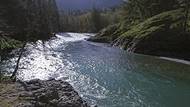 25 mins. (Jeff Gersh, David Fox, Diana Wilmar, Jan Mulder, Greg Bedinger) The Elwha River in Port Angeles, Washington is the stage for the largest dam removal in American history. A century ago, a businessman dammed the waters of the Klallam people where 100-pound salmon cast their shadows. Behind the dynamite and bulldozers that erased Thomas Aldwell’s dream is a saga of competing ideas about the purpose and meaning of a river.
25 mins. (Jeff Gersh, David Fox, Diana Wilmar, Jan Mulder, Greg Bedinger) The Elwha River in Port Angeles, Washington is the stage for the largest dam removal in American history. A century ago, a businessman dammed the waters of the Klallam people where 100-pound salmon cast their shadows. Behind the dynamite and bulldozers that erased Thomas Aldwell’s dream is a saga of competing ideas about the purpose and meaning of a river.
Pale Blue Dot
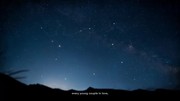 4 mins. (Chin Li Zhi) Set to the words of Carl Sagan, Pale Blue Dot situates human history against the tapestry of the cosmos through an eclectic combination of art styles woven seamlessly together through music and visuals, seeking to remind us that regardless of our differences, we are one species living on Earth.
4 mins. (Chin Li Zhi) Set to the words of Carl Sagan, Pale Blue Dot situates human history against the tapestry of the cosmos through an eclectic combination of art styles woven seamlessly together through music and visuals, seeking to remind us that regardless of our differences, we are one species living on Earth.
A Ghost in the Making
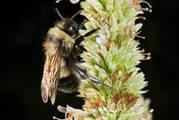 19 mins. (Neil Losin, Morgan Heim, Clay Bolt, Nate Dappen) Everyone has heard about bee declines, but with so much attention focused on domesticated honeybees, someone has to speak up for the 4,000 species of native bees in North America. Natural history photographer Clay Bolt is on a multi-year quest to tell the stories of our native bees, and one elusive species the Rusty-patched Bumble Bee has become his white whale.
19 mins. (Neil Losin, Morgan Heim, Clay Bolt, Nate Dappen) Everyone has heard about bee declines, but with so much attention focused on domesticated honeybees, someone has to speak up for the 4,000 species of native bees in North America. Natural history photographer Clay Bolt is on a multi-year quest to tell the stories of our native bees, and one elusive species the Rusty-patched Bumble Bee has become his white whale.
Boundaries
 7 mins. (Neil Losin, Nate Dappen, Day’s Edge Productions) Humans construct boundaries around our homes, our neighborhoods, and our nations to bring order to a chaotic world. But we rarely consider how these boundaries affect other creatures. Meet conservation photographer Krista Schlyer, who has spent the last seven years documenting the environmental effects of the U.S./Mexico border wall, and biologist Jon Beckmann, who studies how man-made barriers influence the movement of wildlife. Schlyer and Beckmann have seen damaging impacts of the border wall firsthand, but they remain optimistic. Humans probably wont stop constructing walls and fences any time soon, but planning our boundaries with wildlife in mind can help prevent these structures from causing environmental harm.
7 mins. (Neil Losin, Nate Dappen, Day’s Edge Productions) Humans construct boundaries around our homes, our neighborhoods, and our nations to bring order to a chaotic world. But we rarely consider how these boundaries affect other creatures. Meet conservation photographer Krista Schlyer, who has spent the last seven years documenting the environmental effects of the U.S./Mexico border wall, and biologist Jon Beckmann, who studies how man-made barriers influence the movement of wildlife. Schlyer and Beckmann have seen damaging impacts of the border wall firsthand, but they remain optimistic. Humans probably wont stop constructing walls and fences any time soon, but planning our boundaries with wildlife in mind can help prevent these structures from causing environmental harm.
The Secrets Held in Ice
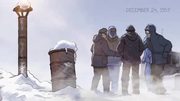 14 mins. (Lo Fontimpe) Follow the adventure of the pioneer glaciologist Claude Lorius who, in 1956, when he was still a young student, left to study Antarctica. This extreme life experience teaches him the principles of survival and solidarity, and reveals to him his vocation: Claude will be a glaciologist. Convinced that the Antarctic ices contain important information for the understanding of our planets climatic history, he will continue his research without respite for three decades. Only then, does the ice reveal an unexpected message.
14 mins. (Lo Fontimpe) Follow the adventure of the pioneer glaciologist Claude Lorius who, in 1956, when he was still a young student, left to study Antarctica. This extreme life experience teaches him the principles of survival and solidarity, and reveals to him his vocation: Claude will be a glaciologist. Convinced that the Antarctic ices contain important information for the understanding of our planets climatic history, he will continue his research without respite for three decades. Only then, does the ice reveal an unexpected message.
